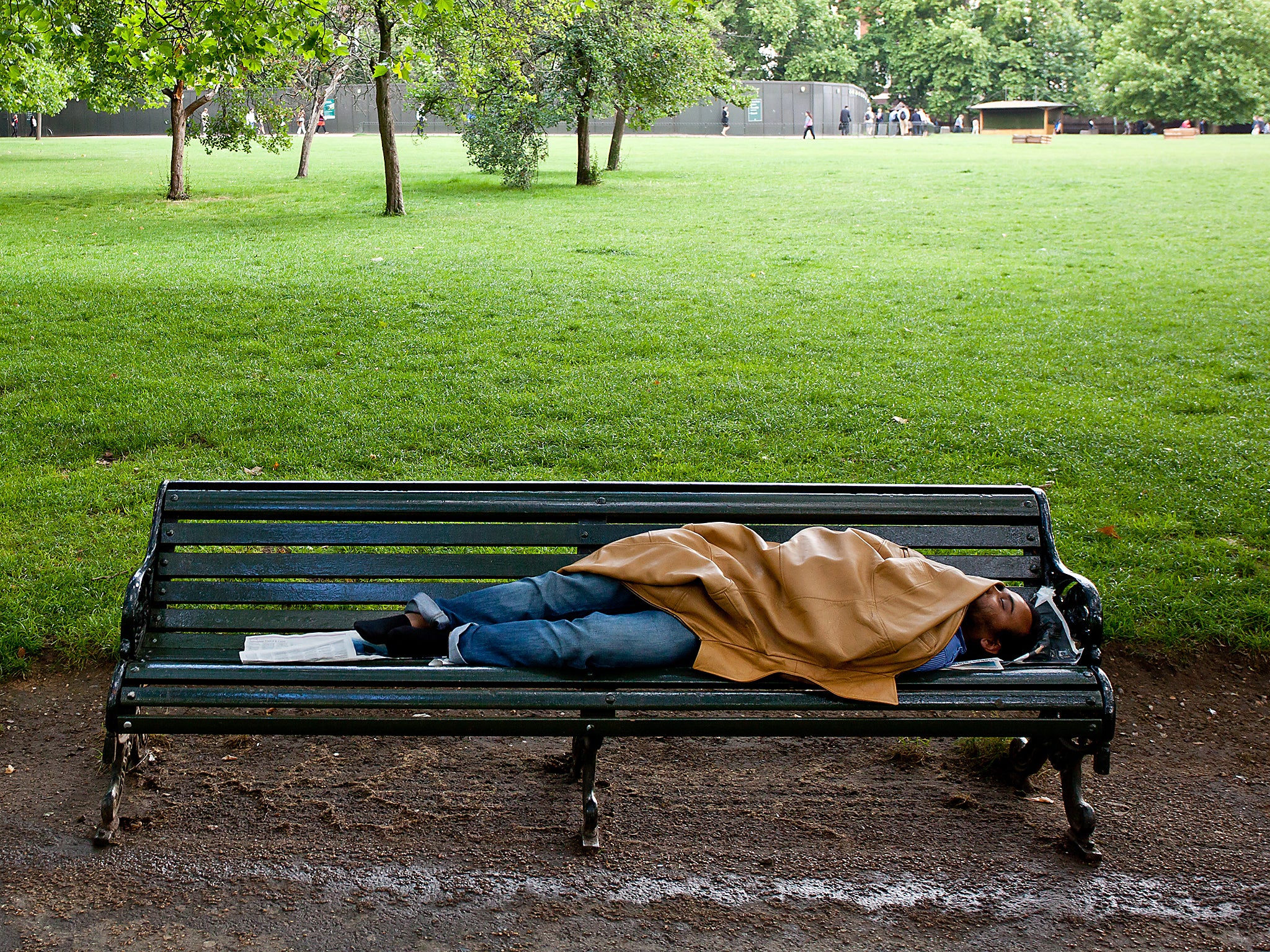Homelessness among ethnic minorities soars under Conservative government, new analysis reveals
Exclusive: Ethnic minorities now account for up to 40 per cent of all homeless households in England, despite being just 15 per cent of the population

Homelessness among ethnic minorities has reached the highest level in more than a decade and has rocketed since the Conservatives came to power in 2010, The Independent can reveal.
A new analysis of official statistics shows 5,030 black and minority ethnic (BAME) households were categorised as homeless between July and September 2016 - up from 3,310 during the same period in 2010.
It means the number of BAME households being accepted as homeless has risen four times faster than among other groups.
Between the summer of 2010, shortly after the Conservatives took office, and the summer of 2016 homelessness among BAME households increased by 52 per cent, compared with 13 per among people classed as "White British".
Ethnic minorities now account for up to 40 per cent of all homeless households in England, despite being just 15 per cent of the population.
The rise was particularly stark among Asians/British Asians, where homelessness increased by 82 per cent in just six years. Among Black/Black British people, homelessness increased by 40 per cent, while 42 per cent more people classed as ‘Chinese or Other Ethnic Group’ were declared homeless. People of mixed ethnicity saw a 63 per cent increase.
| Ethnic group | Q3 2010 | Q3 2016 | Change | % Change |
| White British | 7,960 | 9,000 | +1,040 | +13 |
| Black/Black British | 1,710 | 2,390 | +680 | +40 |
| Asian/Asian British | 730 | 1,330 | +600 | +82 |
| Mixed | 350 | 570 | +220 | +63 |
| Chinese/Other | 520 | 740 | +220 | +42 |
The number of homeless BAME people peaked in 2003 but then more than halved between 2003 and 2010. It has increased rapidly since 2010 and is now at the highest level since 2005.
The figures relate to households that have been deemed unintentionally homeless and "in priority need". Councils have a legal duty to help these people, with the vast majority being placed into temporary accommodation – often in the form of crowded B&Bs or hostels.
It means thousands of ethnic minority people in Britain are being forced to live in temporary homes, where conditions are often cramped and very basic.
Children may be crammed into one room with little space to study or play. Siblings may have to share a bed and families share bathroom and kitchen facilities with strangers.
The figures were released as The Independent campaigns with the charity Centrepoint to raise funds for the first nationwide Young and Homeless Helpline, which will be able to offer assistance to the thousands of 16 to 25-year-olds who face homelessness in the UK every year.
Currently Centrepoint estimates that up to one in three young people seeking help because they are homeless or about to become homeless are turned away unaided by English local councils.
Balbir Chatrik, the charity’s director of policy and engagement, said the increases in homelessness among ethnic minorities were linked to the difficulties members of these communities still faced in getting jobs.
She said: “Unfortunately, it is not surprising that the homelessness figures within black and minority ethnic (BME) communities are increasing.
“While there are many contributing factors to homelessness, the one dominant feature within these communities is a high rate of unemployment. For many years it has been apparent that it’s much harder for young people within BME communities to gain employment, and this can have a direct impact on their housing situation.”
She added that Centrepoint, which achieves 90 per cent positive outcomes with the young people it assists, was doing what it could to address these, and other imbalances:
“At Centrepoint, we believe very strongly in long term solutions. We work closely with every young person that comes to us to build up their skills to enable them to get a job or support them back into college. Only with a secure grounding can housing be properly addressed.”
Labour said the figures were a direct result of Government spending cuts falling disproportionately on minority communities.
Dawn Butler MP, the Shadow Minister for Diverse Communities, said: “Last month we learned that the Conservative cuts affected working households of African Caribbean Asian and minority ethnic women more than any other group.
"I highlighted that this would have a further impact on households and children of those groups. It's no surprise that when you take money out of the homes of African Caribbean and Asian and Minority ethnic women the end result will be more BAME people being made homeless.”
Official homelessness statistics are released quarterly by the Department for Communities and Local Government (DCLG) and record how many households have been accepted by local authorities as being “in priority need” and homeless through no fault of their own. The Independent compared the figures for the third quarter of 2010 with the third quarter of 2016 – the latest period for which data is available.
The Government said it was already acting to tackle homelessness.
A DCLG spokesman said: “This Government is committed to supporting the most vulnerable in our society and ensuring our country works for everyone.
“That’s why we’re investing over £550 million to tackle and reduce homelessness, on top of supporting Bob Blackman’s Homelessness Reduction Bill to prevent more people from becoming homeless in the first place."
Join our commenting forum
Join thought-provoking conversations, follow other Independent readers and see their replies
Comments